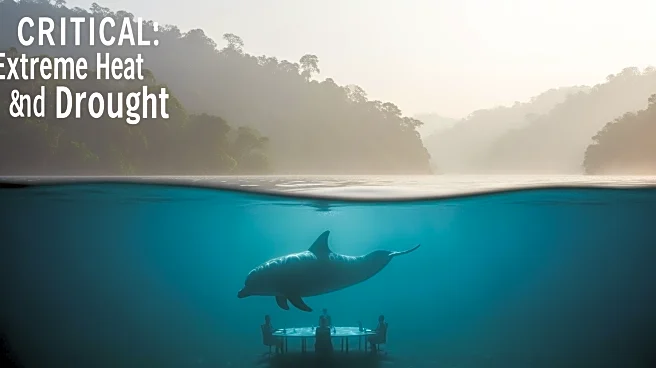What's Happening?
A recent study published in the journal Science has revealed that hundreds of dolphins were found dead in Lake Tefe, Brazil, due to extreme heat and drought conditions. The lake's water temperature reached 41 degrees Celsius, hotter than typical spa baths,
as a result of a severe drought and heat wave that began in September 2023. Researchers from the Mamiraua Institute for Sustainable Development discovered that the lake's surface area shrank by about 75%, and the high temperatures were consistent throughout the water column. The study highlights the impact of climate change on tropical regions and aquatic ecosystems, with significant implications for local communities relying on these lakes for food security and livelihoods.
Why It's Important?
The findings underscore the urgent need to address climate change, as extreme weather events like droughts and heat waves become more frequent and severe. The death of dolphins, which are considered endangered, represents a broader socio-ecological crisis affecting fish populations and local communities. The study calls for long-term monitoring of Amazonian lakes and greater inclusion of local populations in developing solutions. The research also points to the need for global attention on the impacts of climate change on tropical aquatic ecosystems, which have been less studied compared to those in Europe and North America.
What's Next?
The study's lead author, Ayan Fleischmann, plans to advocate for long-term monitoring of Amazonian lakes at the COP30 climate summit. The research team suggests that more comprehensive studies and data collection are necessary to understand the long-term trends and impacts of climate change on these ecosystems. There is also a call for greater collaboration with local communities, including Indigenous peoples, to develop sustainable solutions to mitigate the effects of climate change.
Beyond the Headlines
The study highlights the overlooked problem of rising water temperatures in tropical lakes, which can have detrimental effects on aquatic life and ecosystems. The research points to the need for more attention on the socio-ecological impacts of climate change in tropical regions, which are often assumed to be stable. The findings also emphasize the importance of integrating local knowledge and perspectives in climate change research and policy-making.















